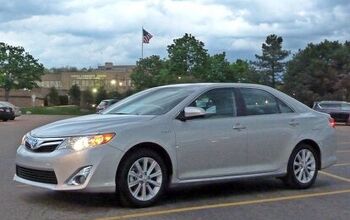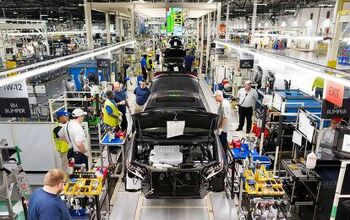QOTD: Which Carmaker Would You Buy Stock In?

We've asked before about which EV startup you would invest in, but what about full-line/legacy carmakers? If you had some extra cash lying around, which one would you invest it in?
Don't just tell us who, tell us why. What has you feeling bullish on automaker X? Is it model mix, product-planning strategy, EV investments ... go ahead and let it all out.
As for me, well, I am ethically prohibited from intentionally investing in an automaker we cover, so I don't know who I'd pick. But most of you have no such restrictions. So, what say you?
[Image: Shutterstock.com/Olivier Le Moal]
Become a TTAC insider. Get the latest news, features, TTAC takes, and everything else that gets to the truth about cars first by subscribing to our newsletter.

Tim Healey grew up around the auto-parts business and has always had a love for cars — his parents joke his first word was “‘Vette”. Despite this, he wanted to pursue a career in sports writing but he ended up falling semi-accidentally into the automotive-journalism industry, first at Consumer Guide Automotive and later at Web2Carz.com. He also worked as an industry analyst at Mintel Group and freelanced for About.com, CarFax, Vehix.com, High Gear Media, Torque News, FutureCar.com, Cars.com, among others, and of course Vertical Scope sites such as AutoGuide.com, Off-Road.com, and HybridCars.com. He’s an urbanite and as such, doesn’t need a daily driver, but if he had one, it would be compact, sporty, and have a manual transmission.
More by Tim Healey


































Comments
Join the conversation
Subaru. Toyota will buy them someday soon.
None. They are all virtue signaling with these garbage government cars (EVs) and, unfortunately, that is a money loser. Look at Ford. Massive price increases (or price gouging?) and they have stopped making any money on the fake Mustang. It still costs Ford $25k MORE to build a fake Mustang than a comparable Edge. That is not a situation that attracts investment.
None
They say history repeats itself. Maybe it does and maybe it doesn't. But a similar pivotal point in history that aligns with where we are today would be the post WW2 auto market.
Americans were starved for new cars and anything with four wheels and a motor sold like pancakes. The Big 3 were of course the immediate go to dealers to visit. But even smaller manufacturers such a Studebaker, Hudson, Nash, Packard and new arrivals such as Kaiser-Frazer enjoyed robust sales. Some of that trajectory was attributed by material shortages after the war and the scramble of manufacturers to acquire steel. In other words, supply-line challenges we've been facing post-covid pandemic had customers lined up and paying over list price similar to what happened 70-some years ago.
But what happened after the demand was satiated? The little guys mostly went out of business. Vehicle manufacturing is capital intensive, and unless a company is well-heeled they won't make it. To further complicate the situation now is the monumental shift to electric propulsion and the number of major manufacturers that have put all their eggs in one basket. Pronouncements that such and such manufacturer will be totally electric by 2030 leaves them horribly exposed to financial failure if even one of the following events comes to fruition: The charging infrastructure remains impossibly behind in meeting the immediate needs for refueling and the move to EV's stalls out, the actual environmental impact of electrification (rare-earth mineral mining/disposal of used batteries, etc.) becomes discovered by the populace and the move to EV's stalls out, or the ownership purchase becomes prohibitively expensive and average drivers simply cannot afford the cost of admission to play in the rich elite's backyard and the move to EV's stalls out. Say what you will, but you are going to see vehicle manufacturers leave an over-crowded market and merger-mania ensue within the decade. I wouldn't touch an automobile stock, but one manufacturer that stands out in my mind is Toyota. Their hybrid approach to both product (continuing to make sedans as an example) and propulsion (gasoline, electric, alt-energy) keeps them top of mind for buyers uncomfortable with the current limitations of EVs. How does GM or Ford compete with that? They can't.
A better investment than a car company in 2022? Take a page out of the past that Esso, Shell and the other petroleum producing companies in the early 1900s did and invest in the business that will power vehicles in the future. Today that would be Electric Utilities.